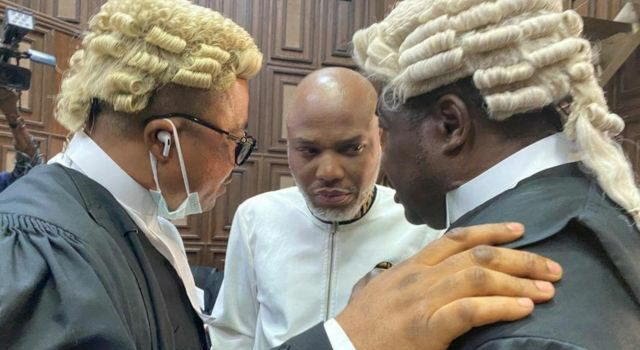Court Rejects Federal Government’s Evidence Against Nnamdi Kanu.
- Home
- Court Rejects Federal Government’s Evidence Against Nnamdi Kanu.

Court Rejects Federal Government’s Evidence Against Nnamdi Kanu.
On Thursday, the Federal High Court in Abuja ruled again
st admitting key evidence presented by the Federal Government in the trial of Nnamdi Kanu, leader of the banned Indigenous People of Biafra (IPOB).
Justice James Omotosho upheld the defence’s argument that the Supreme Court had previously ruled a suspect must have legal representation present during the making of any statements. This overrides a provision in the Administration of Criminal Justice Act (ACJA) that appears to allow some flexibility.
Earlier, the prosecution and defence had presented arguments regarding the admissibility of video recordings and statements made by Kanu during his detention by the Department of State Services (DSS) in 2015. Though the court noted that Kanu appeared calm in the recordings and that the video and written statements were consistent, it emphasized that Kanu had repeatedly stated he was denied access to legal counsel during interrogation.
Justice Omotosho cited Section 17(2) of the ACJA and multiple Supreme Court rulings, affirming that the presence of a lawyer is not optional but a legal requirement tied to a suspect’s fundamental rights. He stressed that in serious charges like those faced by Kanu, this legal safeguard is especially important.
As a result, the judge ruled that the statements and video recordings from October and November 2015, which had been previously admitted, were inadmissible due to the absence of Kanu’s lawyer during their creation. The court formally expunged them from the record.
The decision followed a trial-within-a-trial, a process used to determine whether statements were made voluntarily. Kanu had claimed he was coerced, denied basic rights, and pressured to make politically motivated statements. He also alleged mistreatment, including being held in solitary confinement and in poor conditions.
A DSS operative, testifying for the prosecution, denied these allegations, stating that Kanu was treated well, had access to necessities, and gave his statements voluntarily.
Despite this, the court ruled in favour of the defence, reaffirming the legal requirement for counsel presence during such interrogations, and rejected the disputed evidence.
Manager – Oversees the daily operations, editorial planning, and strategic direction of the platform. A graduate with a solid academic foundation in media and communication, Faith brings a wealth of experience to the TokinPoint.
Discover more from TokinPoint
Subscribe to get the latest posts sent to your email.
- Share
FAITH MIMDOO KEGH
Manager - Oversees the daily operations, editorial planning, and strategic direction of the platform. A graduate with a solid academic foundation in media and communication, Faith brings a wealth of experience to the TokinPoint.
